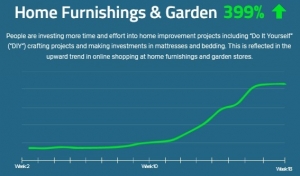Fraud prevention and payments leader Forter is closely monitoring the buying trends of consumers and the incidence of fraud during the pandemic and looking ahead to the future.

Forter’s May 2020 report on e-commerce purchase trends provides both hope and strategic intelligence for online merchants and sellers. Despite some fraud challenges, there are some positive product sector purchase trends and we’ve got a quick overview to guide you on new fraud prevention info and sales opportunities.
May fraud trends overview
In April, travel restrictions, loss of employment, and shelter-in-place guidance all changed how consumers shop and how merchants interact as a result of these new online preferences. Food and beverage, and online grocery shopping showed growth in sales volume. For many merchants who were traditionally store-first, the pandemic and lockdown caused a dramatic shift in focus, with online becoming the primary channel. It’s a new digital-first reality.
In the first week of May, new product sales patterns and consumer preferences emerged. So did a shift in fraud incidents.

Merchants started sales promotions and Forter researchers noted a corresponding increase in more sophisticated fraud attempts, including social engineering and account takeover (ATO) attempts which increased by 179% over April.
The use of gift cards also grew in May as merchants tried to entice consumers back into brick-and-mortar stores, particularly in the home furnishings, garden, and apparel and accessories categories. Online food and beverage, and grocery delivery categories have also offered gift cards. Gift cards are also attracting fraudsters because of their anonymity and relatively high resale value between 25% and 50% of real card value.
Contactless deliveries have caused a jump in front porch theft and claims of non-delivery. Chargebacks are also increasing as consumers file claims for non-delivery or other delivery problems.
Forter detected a 54% rise in collusion where fraudsters cooperate to boost each other’s sales in online marketplaces. Interestingly, product returns abuse decreased by 22% as consumers seem less inclined to return the essential products they purchased. Researchers predict a return to higher product returns abuse and loyalty program abuse as consumer purchases return closer to normal.
What product categories grew?
Here’s some relatively good news for online sellers. In numerous categories, transaction volumes increased including:

- beauty and healthcare jumped 235%
- fashion and apparel up 99% accompanied by 3 to 4 times the number of gift card purchases
- eyewear grew 640% while jewelry was up 17%
- food and beverage increased 139% while, not surprisingly, alcohol grew 300% as bars and restaurants remained mostly closed and discovered consumers home delivery of spirits
- online grocery delivery continued its growth, up 236%
- home furnishings and gardening grew 399% with mattresses and bedding up 593%
- virtual coins grew 93% and gaming increased 39%
- marketplaces grew solidly by 88% but the report cautioned operators to be aware of potential delivery and supply chain challenges by new merchants which could increase chargebacks and potential fraud.
Which products decreased again?
The industries hardest hit by the pandemic remained the same with transactions in travel down 94%, hotels down 81%, and ground transportation dropped 86%.

Despite this bad news, there is some optimism for the travel industry in the report. “Forter data indicates that Americans are anticipating being able to travel when looking at dates 120 days and more in advance (150% increase in the last month) and so are Chinese travelers (68% increase in the last month), while Europeans are not. Hotel bookings are also showing some progress, with an 86% increase over the past month, driven by domestic travel,” the report said.
Fraud prevention tips
Forter offers several fraud and abuse prevention tips in the current and future environment. Manual processes will no longer be adequate because they cannot scale to meet larger anticipated e-commerce sales volume.

Automation offers some valuable solutions according to the report, “Working with such technology, business can achieve up to a 90% reduction in false declines of legitimate buyers, alongside a 90% reduction in chargebacks.”
Forter is a leader in e-commerce fraud prevention, processing over $150 billion in online commerce transactions and protecting over 600 million consumers globally from credit card fraud, account takeover, and identity theft. You can review the May 2020 “Impacts to Global E-Commerce and Fraud Trends Amid Coronavirus” report here.
Data and visuals courtesy of Forter








LET’S CONNECT